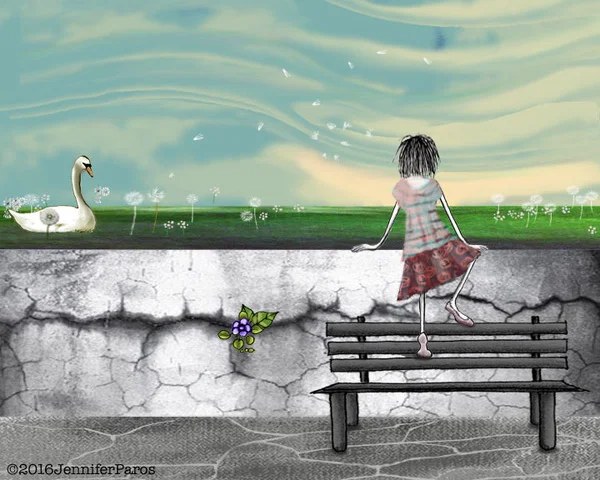The Other Side of Zero: Leaving the Negatives
by Jennifer Paros
August 2016
Negativity is the enemy of creativity . . . [It] occupies the mind and leaves little room for creative ideas.
~ David Lynch
When I was a little girl, I often felt negative and sometimes feared being seen as bad-tempered. My astrological sign, Cancer, has the crab as its symbol and I hated that it was a crab; I didn’t want to be a crab. I wanted to be something great and beautiful and seemingly uncomplaining – like a zebra.
Once in high school, while walking to class with a close friend who took to condemning the latest (unartistic) graffiti and its perpetrators, I came to the defense of those with the impulse to scribble all over things. I declared there were legitimate reasons for the discontent behind the graffiti. I thought my friend was clueless. It was easy for her to be at peace with her environment and circumstances, so she thought others should feel the same and therefore do the right thing. But I knew different. Though I never lifted a can of spray paint to my school, I had certainly covered it with mental graffiti many a time.
So, in the summer, fall, winter, and spring of my discontent, I felt a brooding dissatisfaction with things, beginning and ending with me. I hated the negative aspect of my thinking but also identified with it and regularly argued for it. Negativity has its lure; it scratches an itch. It seems to purport intelligence because it doesn’t comfortably accept things as they are. It can provide a fleeting feeling of power or control in regard to unwanted conditions. Often, being negative is confused with being realistic and so can make us think we are clearer, more alert to danger, maybe even more caring. Though negativity is a part of our sorting and processing system, it is not hospitable – it never makes for an environment in which we can grow. Ultimately even when it highlights injustice or the need for change, one must step away from it in order to create the new.
Years ago, there was a television reality show in which a team of doctors reworked a person’s physical form from head to toe, a complete makeover. There was dental work, nose jobs, lifts and tucks of all kinds, reduction and enhancement – whatever the person “needed.” The show was called The Swan, referencing the Hans Christian Anderson fairy tale, The Ugly Duckling. But in the actual story the ugly duckling does nothing to become beautiful; the duckling just realizes he is a swan. The cygnet is confused for a duckling and looks ugly and odd to the others because they’ve mistaken him for what he is not. His transformation doesn’t occur through changed physical conditions, he is transformed through realization. His transformation requires only that he recognize what he is rather than what he isn’t. Fixation on the negatives – what the swan wasn’t – was the only real problem.
In order to carry a positive action, we must develop here a positive vision.
~ Dalai Lama
When we are “negative” we are focusing on lack, the absence of what we want. Logically, the observation of absence makes us feel empty – and bad. But there are many ways of telling a fulfilling story.
There was a popular post recently by an eight-year-old Australian girl, Cadence, diagnosed on the autism spectrum. She explains how she doesn’t consider autism a label but an “ingredient” in who she is. With this perspective, autism is something added to her experience, not something taking from it. Cadence is recognizing what she’s got, seemingly without judgment, and so is valuing the wholeness of her life.
Taking stock of the ingredients of our lives lifts us out of the negatives – to the other side of zero where we can build and create. We can’t create with negatives. I’ve never known of a writer who started a story by jotting down everything he/she didn’t want it to be. We’ve got everything we need, all the building blocks to make things we love – as long as we don’t negate those elements. Turning away from the good, looking at life and ourselves in a diminishing way, takes us out of touch with our power.
Back when I didn’t want to be a crab, I didn’t understand that my life, rich with content, is always mine to both create and discover. Additionally I had yet to realize that life, technically the holder of all we see as negative and positive, is itself intrinsically positive. And so was I.
Jennifer Paros is a writer, illustrator, and author of Violet Bing and the Grand House (Viking, 2007). She lives in Seattle. Please visit her website at www.jenniferparos.com.

